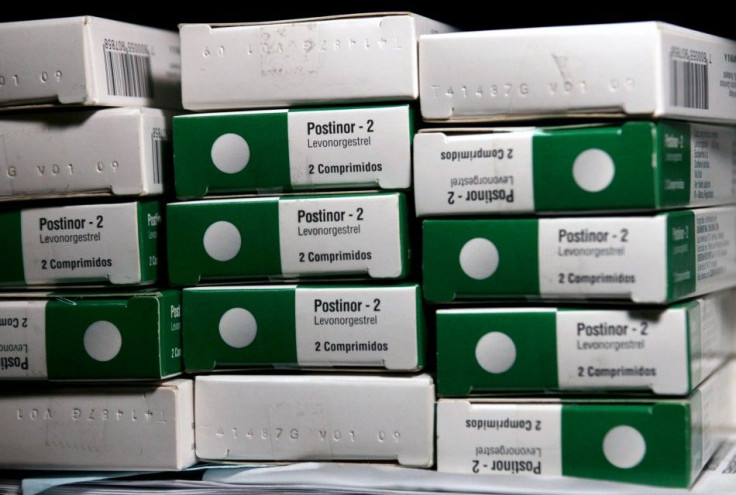Health Secretary Blocks Wider Access to Morning-After Pill

WASHINGTON (REUTERS) - The health secretary overruled government scientists and refused to bring the controversial morning-after pill from behind the pharmacy counter and onto drugstore shelves.
Health and Human Services Secretary Kathleen Sebelius on Wednesday used her power to trump the Food and Drug Administration's plan to do away with the age limit on who can buy Teva Pharmaceutical Industries Ltd's Plan B One-Step pill without a prescription.
The pill, which has to be taken within 72 hours of unprotected sexual intercourse, has been available without a prescription to women over 17, but they have to still ask a pharmacist for help and show identification for an age check.
Girls under 17 need a prescription to buy the drug.
Sebelius's move drew shocks and puzzlement from women's health advocates who say it goes against President Barack Obama's pledge to reassert the power of science in his administration's decisions.
An FDA spokeswoman said no health secretary has ever overruled the agency. The FDA itself has drawn fire in the past for being slow to expand access to the morning-after pill.
FDA approval would have likely put the morning-after contraceptive on drugstore shelves next to condoms and other family-planning products -- a politically sensitive issue leading up to the 2012 elections.
The whole thing is extraordinary and does not make any sense, said Susan Wood, former head of the FDA's Office of Women's Health who resigned in protest over the agency's handling of the drug in 2005.
I had come to believe that the FDA would be allowed to make decisions based on science and the public's health. Sadly, once again, FDA has been overruled and not allowed to do its job.
CONTRADICTORY OPINION
Teva had asked the FDA to lift the age limit to let all women capable of getting pregnant quick access to the drug.
The company has maintained that wider access was not intended to sell Plan B to teenage girls, but to allow the target audience of women aged 18 to 49 to be able to buy the pill without an uncomfortable ID check, and at any time.
FDA scientists' review supported approval of Teva's request and Commissioner Dr. Margaret Hamburg planned to do just that, but Sebelius's disagreement led her to leave access to Plan B One-Step limited.
The move is the latest salvo in a decade-long battle over the pill, which critics say could lead to promiscuity, sexual abuse and fewer important doctor visits if readily available for purchase.
Advocates for such emergency pills say they help reduce unwanted pregnancies or abortions and that quick, easy access for women of all ages is critical for the medicines to work.
Politically, contraception is a flash point .. . but in the medical community and the general public, it is a normal part of daily lives. We had thought that Secretary Sebelius understood that, said Amy Allina, who leads advocacy work at the non-profit National Women's Health Network.
In her statement, Sebelius said Teva did not present enough evidence to show that younger girls would properly understand and use the pill, meant to prevent unintended pregnancies, without talking to a doctor first.
Sebelius highlighted that while on average girls reach reproductive age by 12.4 years, some are capable of bearing children at 11.1 years.
Teva had based its request to the FDA on a study of actual use of the contraceptive in girls ages 11 to 16. It remains unclear what specific data Sebelius believes is lacking.
LONG-TIME BATTLE
Medical and women's groups since 2001 have sought wider access for the drug, which Teva acquired in 2008, and have in the past sued the FDA over Plan B. Many now say they plan to boost their efforts to hold Sebelius and Obama accountable.
The White House had no immediate comment on Sebelius's decision. It was unclear how electoral politics might have figured in the move.
The Secretary made this decision, an administration official said when asked whether it was made by Sebelius alone.
When asked whether she consulted in advance with President Barack Obama or with the White House, the official would only add: Agencies routinely consult/inform the White House about a wide range of issues and decisions.
Activists' efforts to widen access to the emergency contraceptive had previously stalled under President George W. Bush, unleashing a wave of lawsuits and congressional protests that the FDA was letting politics trump science.
In 2006, the FDA allowed limited behind the counter sales for women 18 and older that required identification checks. In 2009, the agency lowered the limit to age 17 while continuing to require prescriptions for younger girls.
Plan B, approved for sale in 1999 as the first U.S. emergency contraceptive , contains a higher dose of the hormone progestin that has been widely used in regular birth control pills for decades.
FDA experts, including gynecologists and pediatricians reviewed the totality of the data (on Plan B) and agreed that it met the regulatory standard for a nonprescription drug and that Plan B One-Step should be approved for all females of child-bearing potential, Hamburg said in a statement.
Teva expressed its disappointment at the last-minute HHS action despite FDA's positive recommendation.
The company's sales of Plan B One-Step last year reached $80 million , according to IMS Health data.
Teva's shares closed down 0.2 percent on the Nasdaq.
(Additional reporting by Jeff Mason; Editing by Robert MacMillan, Bernard Orr)
© Copyright Thomson Reuters 2024. All rights reserved.






















